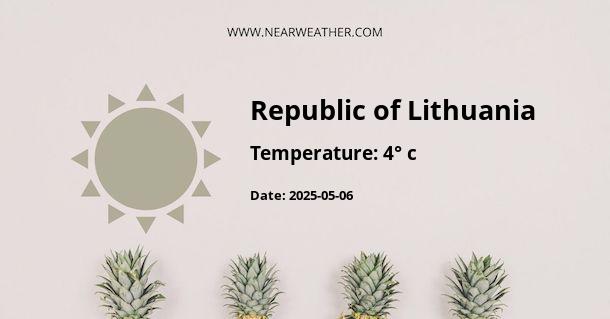Climate and Weather in the Republic of Lithuania (LT)
The Republic of Lithuania, located in Northern Europe, experiences a temperate maritime climate with distinct seasons throughout the year. Situated on the eastern shore of the Baltic Sea, Lithuania is subject to various weather patterns influenced by the sea, surrounding landmasses, and air masses from both the east and west. The country's climate is characterized by mild summers, cold winters, and moderate precipitation.
Seasonal Overview
1. Spring (March - May): Spring in Lithuania is a transitional season, with gradually warming temperatures and increasing daylight hours. March is still chilly, with average temperatures around 2°C (36°F) and occasional snowfall. By April, temperatures rise to around 8°C (46°F), and the landscape starts to bloom with the arrival of spring flowers. May brings milder days, with temperatures reaching an average of 15°C (59°F).
2. Summer (June - August): Lithuania's summers are generally mild and pleasant, with average temperatures ranging from 16°C (61°F) to 22°C (72°F). June is often the sunniest month, with up to 9 hours of sunshine per day. July and August are the warmest months, with occasional heatwaves pushing temperatures above 25°C (77°F). However, the coastal areas remain slightly cooler due to the influence of the Baltic Sea.
3. Autumn (September - November): Autumn brings cooler temperatures and increased rainfall to Lithuania. September still offers mild days with temperatures around 15°C (59°F), but by October, temperatures drop to 8°C (46°F). November is the beginning of the colder season, with average temperatures around 3°C (37°F) and occasional early snowfall.
4. Winter (December - February): Winters in Lithuania are cold, with temperatures often dropping below freezing. December is the start of the winter season, with temperatures around -2°C (28°F). January and February are the coldest months, with average temperatures ranging from -6°C (21°F) to -2°C (28°F). Snowfall is common during this period, creating a picturesque winter landscape across the country.
Precipitation
Lithuania experiences moderate precipitation throughout the year, with slightly higher amounts in the summer months. The average annual precipitation in Lithuania ranges from 550mm (21.7 inches) along the coast to 800mm (31.5 inches) inland. The wettest months are usually July and August, with an average of 70-80mm (2.8-3.1 inches) of rainfall. Winter months, particularly December and January, often see snowfall, which can accumulate to significant depths, especially in the eastern parts of the country.
Wind Patterns
Lithuania is influenced by various wind patterns due to its geographical location. The prevailing winds blow from the west and southwest, bringing moist air from the Atlantic Ocean. These westerly winds moderate temperatures during the winter months. In contrast, easterly winds, originating from the continent, can bring colder air masses, leading to lower temperatures and occasionally severe frosts.
Climate Statistics
Here are some climate statistics for selected cities in Lithuania:
| City | Average Temperature (°C) | Average Precipitation (mm) | Sunshine Hours |
|---|---|---|---|
| Vilnius | 4.7 | 612 | 1,643 |
| Klaipėda | 7.0 | 706 | 1,513 |
| Kaunas | 5.4 | 651 | 1,616 |
| Šiauliai | 4.6 | 680 | 1,558 |
Source: Lithuanian Hydrometeorological Service
Tourist Considerations
When planning a visit to Lithuania, it is essential to consider the seasonal weather patterns. Summer (June to August) is an ideal time for outdoor activities, as the weather is mild and days are longer. It is also the peak tourist season when many cultural festivals and events take place. Spring and autumn offer milder temperatures, making it suitable for exploring cities and enjoying the beautiful countryside. Winter attracts those who enjoy winter sports and the enchanting winter scenery.
It is advisable to pack layers of clothing, as temperatures can vary throughout the day, especially during transitional seasons. Rainfall is common, so having waterproof attire and footwear is recommended. In winter, warm clothing, including hats, gloves, and sturdy boots, is essential to stay comfortable in the cold weather.
In Conclusion
The Republic of Lithuania experiences a temperate maritime climate with distinct seasons. From the mild summers to the cold winters, each season offers its unique charm. The climate statistics provided for selected cities give a glimpse into the average temperatures, precipitation, and sunshine hours experienced across the country. Whether you are visiting during the warm summer months or embracing the winter wonderland, Lithuania offers a diverse range of experiences for every season.
A - Republic of Lithuania's Latitude is 56.000000 & Longitude is 24.000000.
A - Weather in Republic of Lithuania is -3° today.
A - Climate Conditions in Republic of Lithuania shows overcast clouds today.
A - Humidity in Republic of Lithuania is 65% today.
A - Wind speed in Republic of Lithuania is 24.34 km/h, flowing at 183° wind direction. today.
